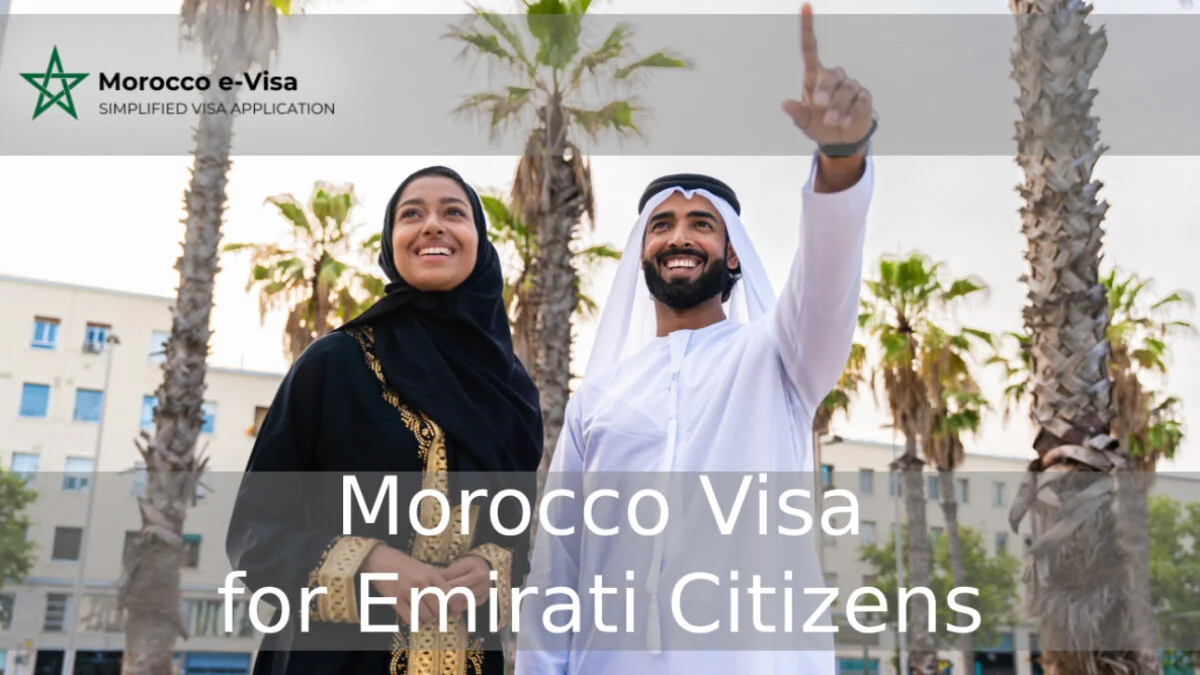
Emirati citizens do not need a visa to travel to Morocco and can stay for up to 90 days without one.
However, for visits more than 3 months, a Long-Term Morocco Visa is required – it is multiple-entry and can be obtained through the embassy.
It is important to note that while UAE nationals do not need a visa for short-term visits, they must still comply with all entry requirements set by Moroccan authorities.
Travelers from the Arab Emirates are advised to confirm that their passports have a validity of at least 6 months from the date of entry into Morocco.
Also, UAE citizens need proof of sufficient funds, a return flight ticket, and insurance.
NOTE: For those Emiratis who need an extended stay, it is recommended to begin the Morocco visa application process well in advance to have timely approval.
Morocco Visa Types
Morocco offers visa options to meet the diverse needs of Emirati travelers, ensuring a seamless experience for any purpose or duration of stay.
Short-Stay Visa
Short-Stay Visas are ideal for trips of up to 90 days and are intended for non-immigration purposes like tourism, business, or short-term events.
Emirati travelers can opt for Single-Entry Visas for a one-time visit or Multiple-Entry Visas for multiple trips during the visa’s validity.
Long-Stay Visa
For longer stays, Emirati citizens must obtain a Long-Stay Visa. Issued by Moroccan diplomatic or consular authorities, these visas are valid for up to one year.
However, individual stays in Morocco cannot exceed 90 consecutive days, making them ideal for extended but flexible visits.
Transit Visa
A Transit Visa is required for Emirati nationals passing through Morocco on their way to another destination.
This visa applies if the traveler intends to remain within Moroccan territory for a brief period, generally less than 72 hours.
Electronic Visa (eVisa)
The Morocco eVisa provides a convenient and hassle-free option for Emirati citizens intending to visit for short durations. This entirely online visa application process simplifies entry requirements for leisure or tourism purposes.
The Electronic Visa is valid for 180 days from the issue date and permits a stay of up to 30 days per trip.
Documents Necessary to Apply for Morocco Visas
To successfully apply for a Moroccan visa, it’s essential for UAE nationals to prepare and submit the required documentation.
Below is a detailed list of the key documents typically needed:
- Valid passport: Check if your passport is up-to-date, has enough blank pages, and meets Moroccan expiration date requirements.
- Travel itinerary: Provide proof of a return or onward ticket to confirm your plans to leave Morocco after your trip.
- Accommodation details: Submit confirmed hotel reservations or a letter from your host outlining where you’ll stay.
- Invitation letter: If applicable, include a formal letter from your host (individual or organization) explaining the purpose and duration of your visit.
- Financial proof: Show recent bank statements to verify you have sufficient funds to cover your stay.
- Recent photo: Attach a clear, high-quality photograph that meets official size and format guidelines.
Depending on the type of visa you are applying for, additional documents may also be requested.
Be sure to thoroughly review the specific requirements set by the Moroccan Consulate or Embassy to make sure all documents are in order.
Stay, Validity, and Extensions for Emirati Citizens
Emirati citizens may enter visa-free and stay for up to 90 days within a 6-month period, but this visa-free stay cannot be extended, and travelers must leave Morocco before the 90-day limit.
For longer stays, such as for employment, studies, or family reunification, Emiratis must apply for the appropriate Long-Term Visa.
These visas are usually valid for several months to one year and can often be renewed in Morocco if the required documents are provided.
Transit stays are generally covered under the visa exemption, though any extension beyond the allowed period would only be considered in exceptional circumstances.
Application for Morocco Visa
Applying for a Morocco visa is a straightforward process if all requirements are met and files are prepared in advance.
This step-by-step guide will help Emiratis through the application process:
- Visit the official Moroccan eVisa portal at https://www.acces-maroc.ma/#/ and select “Apply for an eVisa”.
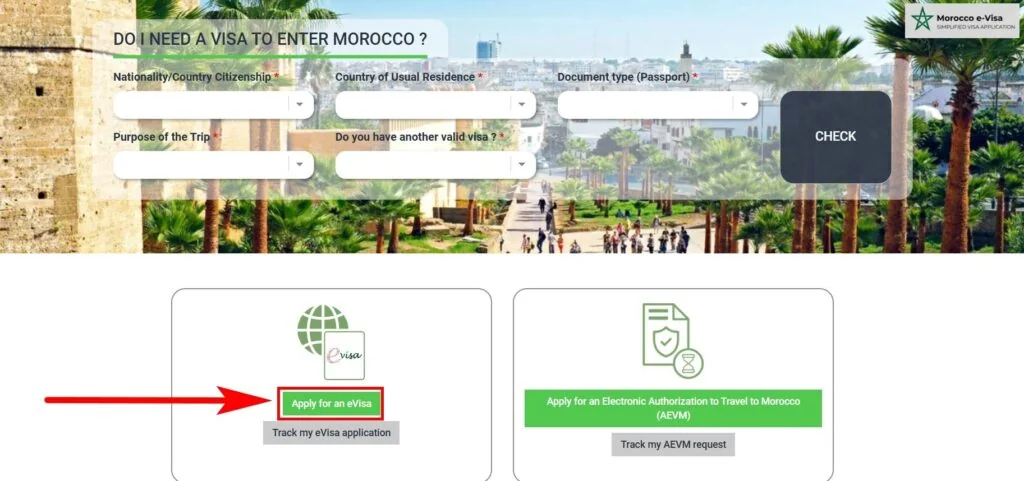
- Type in your email address, confirm it, and then click “Enter”.
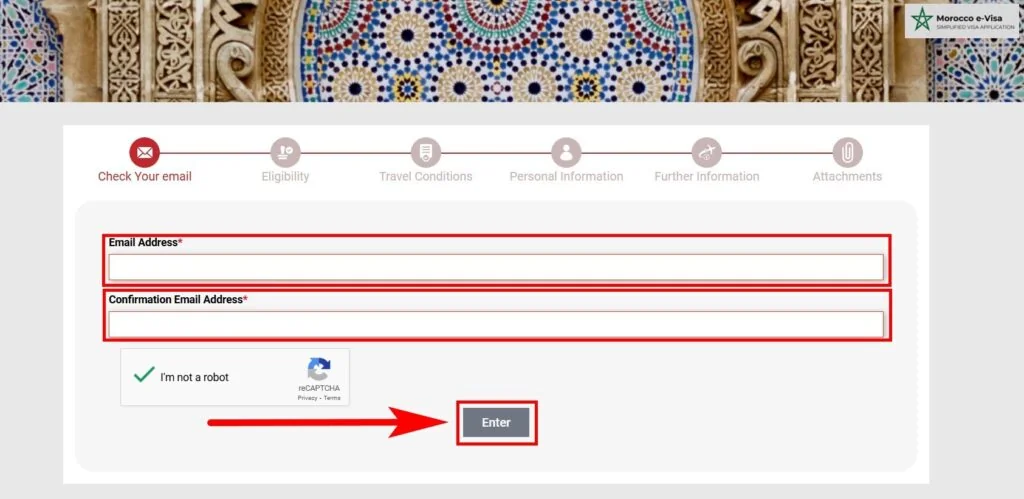
- Open your email inbox and click the verification link sent to you.
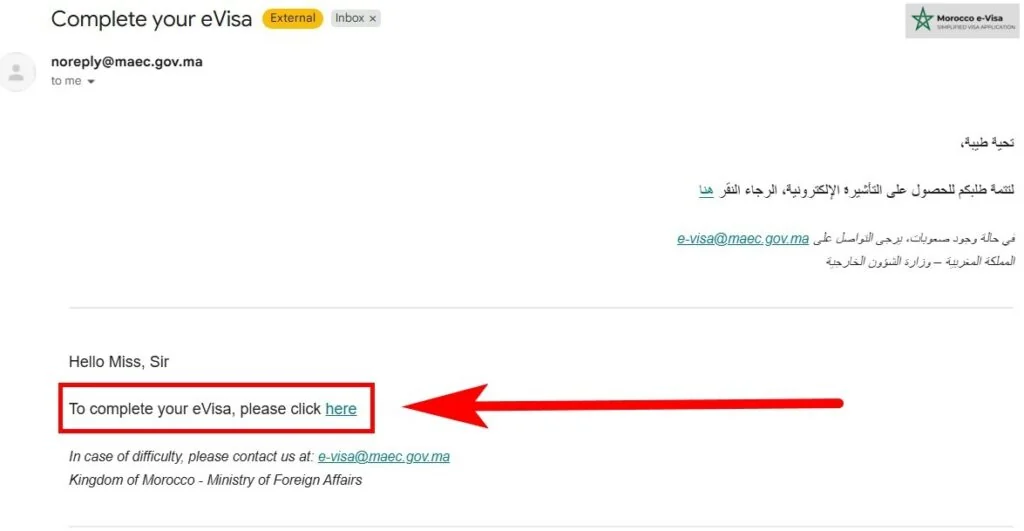
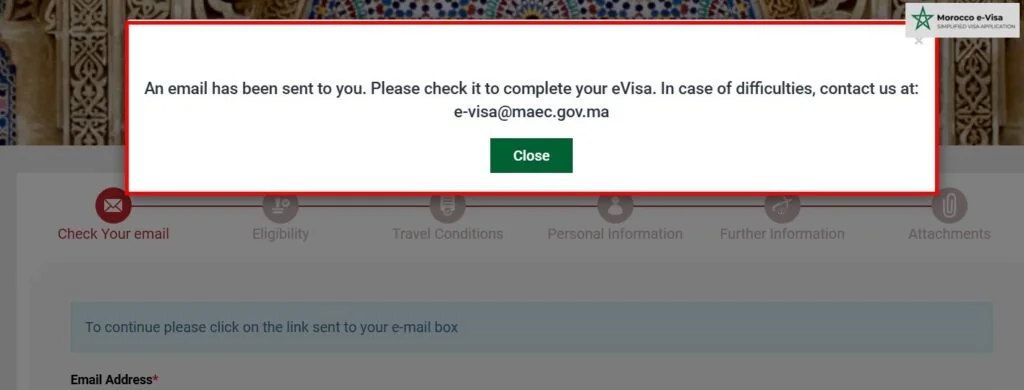
- Complete the first form by providing your general details (nationality, country of residence, date of birth, passport type, purpose of visit, and valid visa or residence permit, if applicable). Click “Next” to continue.
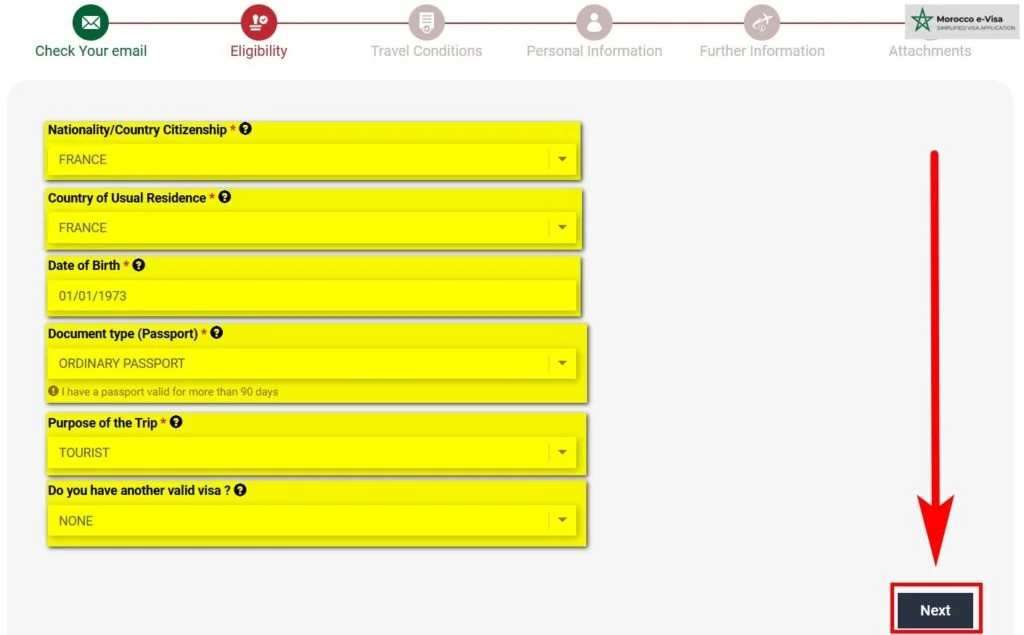
- Read through the travel conditions carefully, tick the required boxes to accept, and then press “Next”.
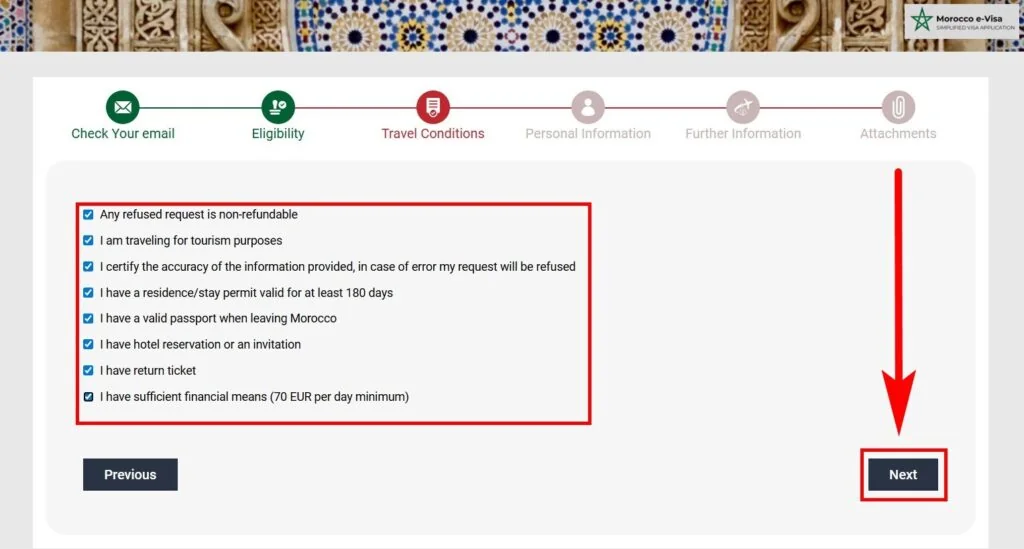
- Enter your personal information exactly as it appears in your passport.
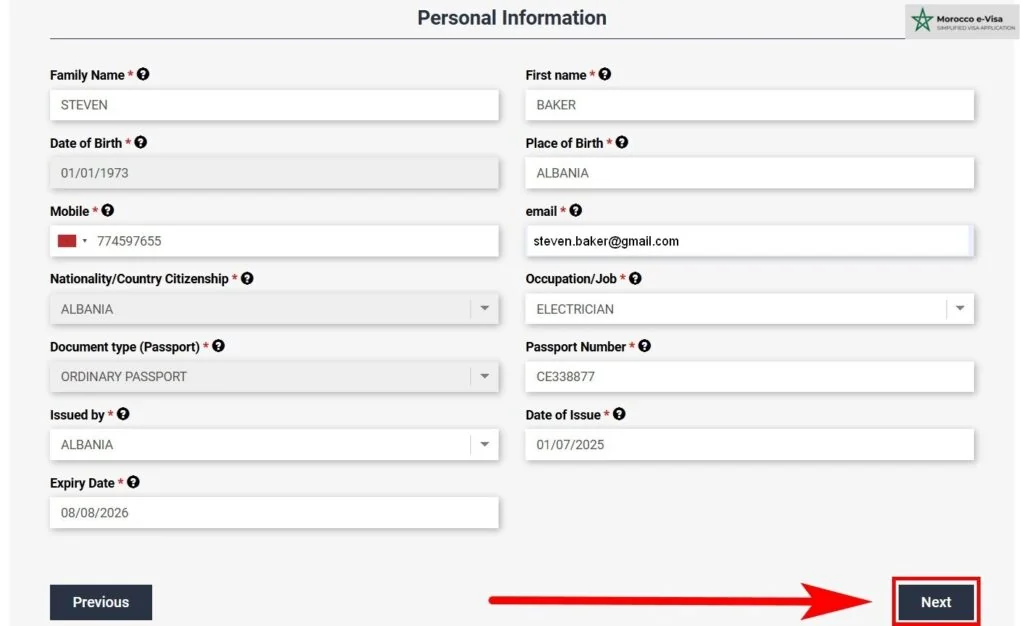
- Provide any additional details requested in the “Further Information” section, such as your planned arrival and departure dates, then click “Next”.
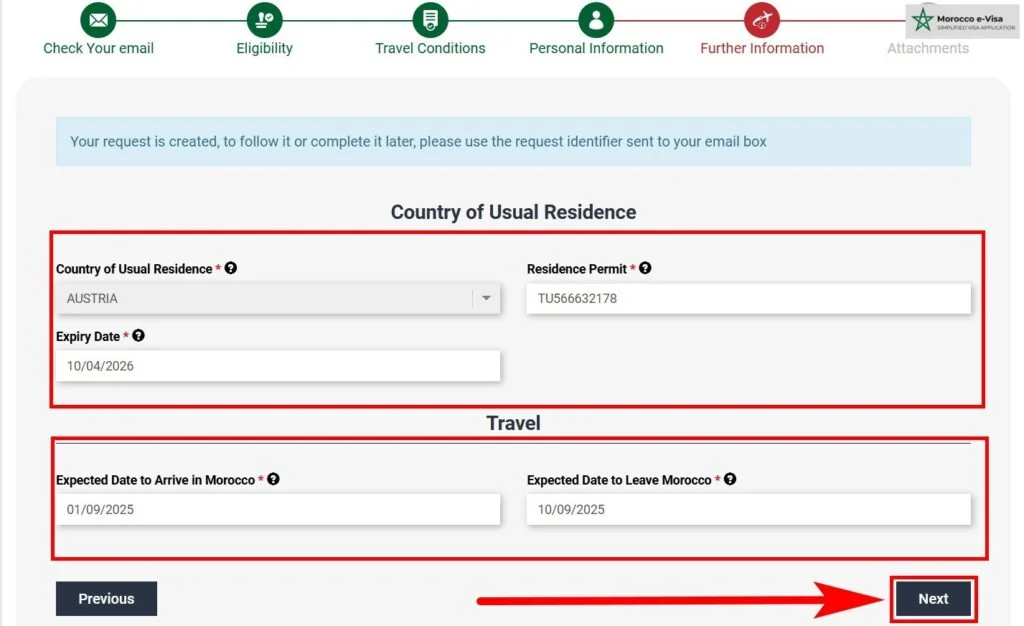
- Upload the necessary documents, including a recent passport photo, a scanned copy of your passport bio page, and a residence permit or valid visa (if required). After this, click “Save”.
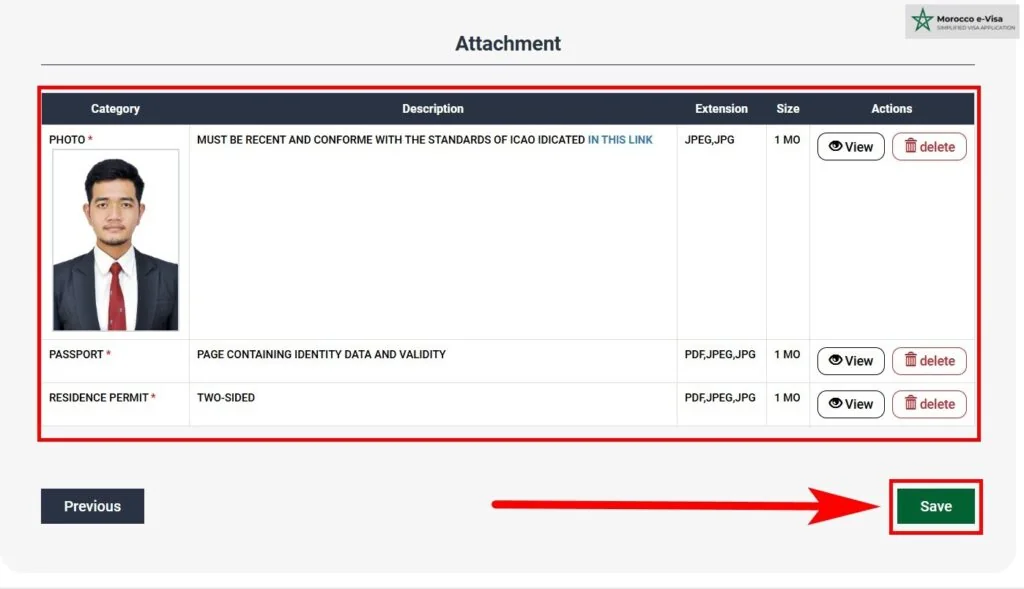
- See a message showing the validity period of your visa and the maximum duration of stay allowed.
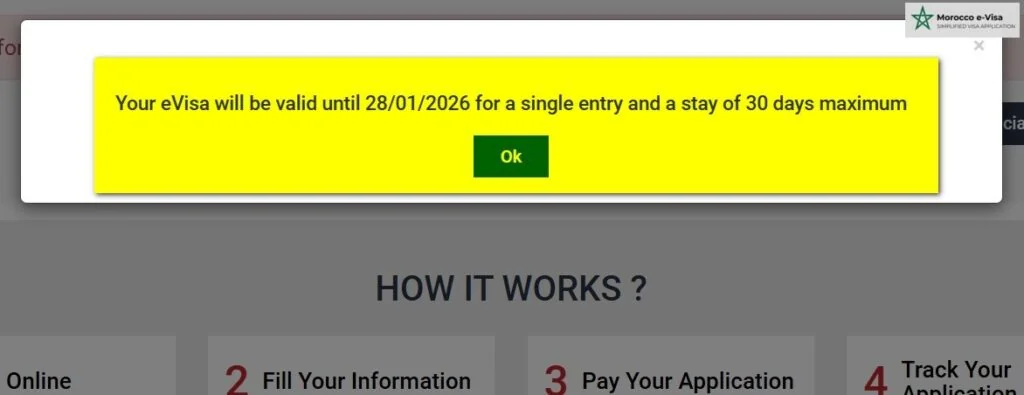
- Review all the details you entered carefully. Once everything is correct, click “Enter”, and then confirm by selecting “Confirm your request”.


- Choose “Proceed to payment” to move forward.

- Select your preferred processing option, then click “Pay”.
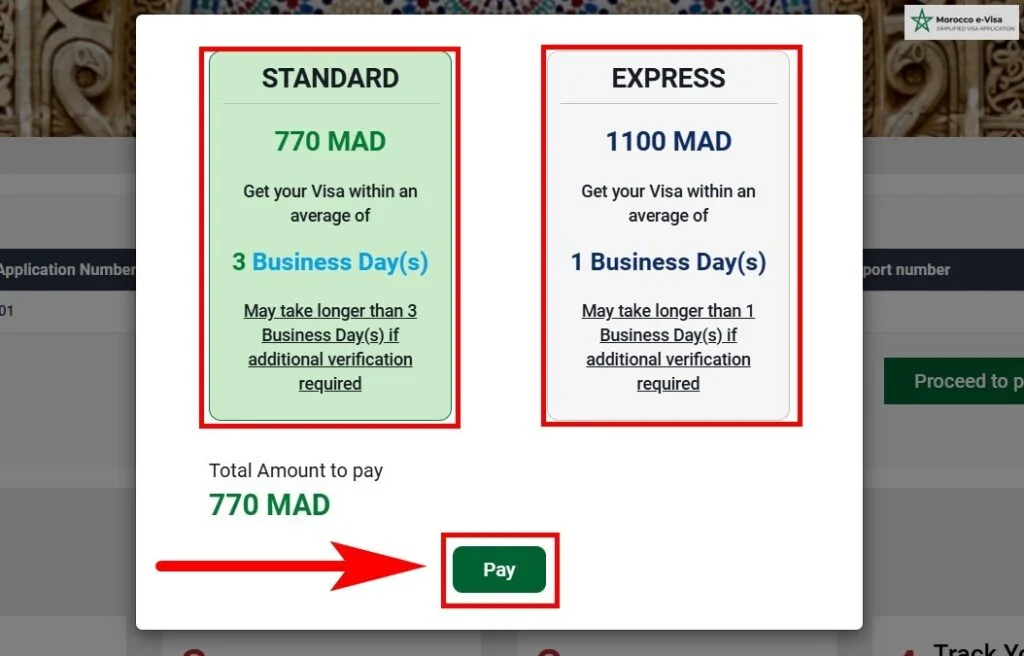
- Enter your bank card information and confirm the payment by clicking the green “Confirm payment” button.
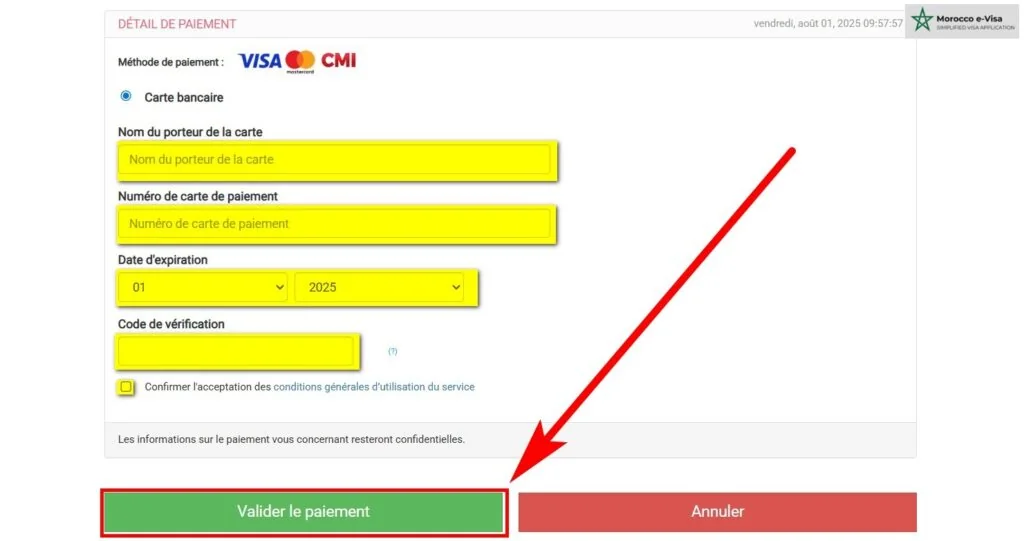
- Get an eVisa by email and print a copy, and carry it with your passport when traveling to Morocco.
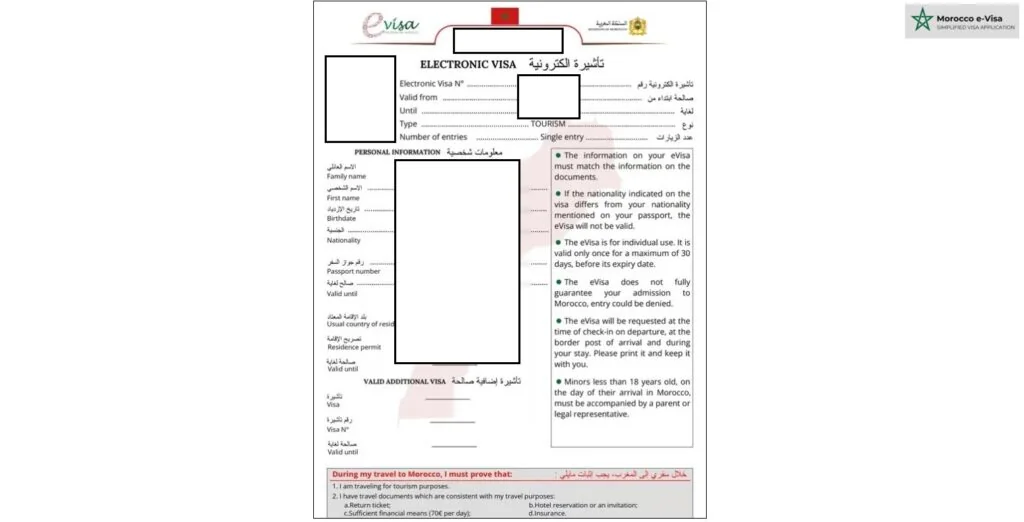
Following the steps carefully can help avoid delays or refusals in your visa application process.
Always double-check the latest requirements and guidelines provided by the Moroccan authorities to have a smooth application experience.
Processing Time for Morocco Visas
The time it takes to process a Moroccan visa can vary greatly depending on the specific type of visa you are applying for and the embassy or consulate handling your application.
For UAE citizens, the standard processing period is generally around 10 business days.
However, during busy travel seasons or if additional documentation is required, the checks may take as long as 30 days.
It’s always a good practice to check with your local Moroccan Embassy or Consulate for precise timelines.
IMPORTANT: Submitting the Morocco visa application well in advance of the planned travel date is highly advisable to account for any potential delays.
Morocco Entry Requirements for UAE Citizens
To guarantee a smooth entry into Morocco, UAE nationals must comply with specific entry requirements.
These measures are put in place to facilitate travel while meeting Moroccan immigration policies.
The list of essential documents for a trip to Morocco includes:
- Proof of funds: Show that you can support yourself during your stay, either with an international bank card or at least 70 euros per person per day in cash.
- Travel insurance: A valid policy covering medical treatment and repatriation for your entire stay.
- Passport: Must have at least 6 months of validity remaining.
- Visa: Required for stays longer than 90 days.
- Return ticket: Proof of your departure from Morocco, either back to the UAE or to your next destination.
It is crucial to have all these files prepared and organized before departure to avoid any issues at Moroccan border control.
Moroccan Consulate for Emirati Nationals
The Moroccan Consulate plays a crucial role in supporting Emirati nationals with their travel and legal matters related to Morocco.
It serves as a primary resource for issuing visas, providing information on entry requirements, and assisting with any consular services that Emiratis may require during their stay in Morocco.
For UAE travelers, the consulate ensures a smooth process by addressing inquiries and offering the necessary documentation.
- Address: Villa #116, Street 30, Community #334 Satwa-Jumeira, Dubai.
- Phone: +(971) 4 34 96 377
Frequently Asked Questions for Emirati Travelers to Morocco
- Do UAE citizens need a visa to travel to Morocco?
No, UAE nationals do not need a visa for short leisure and business trips to Morocco lasting up to 90 days.
- What is the validity period of the Long-Term Morocco Visa?
The Long-Term Morocco Visa is valid for up to 1 year, allowing multiple entries, with each stay limited to 90 consecutive days.
- How can Emiratis apply for a Long-Term Morocco Visa?
To apply, visit the Moroccan Embassy or Consulate and submit the necessary documents.
- Are there specific requirements for UAE citizens’ passports?
Your passport must have at least 6 months of validity from the date of entry into Morocco and should have sufficient blank pages.
- Do UAE citizens need travel insurance for Morocco?
Yes, valid travel insurance covering medical treatment and repatriation is mandatory for entry into Morocco.
Conclusion
Traveling to Morocco as a UAE citizen is a seamless experience thanks to the visa-free agreement for short stays, making it an attractive destination for leisure and business travelers alike.
However, understanding the entry requirements and preparing the necessary documentation is essential for a hassle-free trip.
For those intending to have longer stays, initiating the Morocco visa application process early and following the outlined procedures can ensure successful approval.
